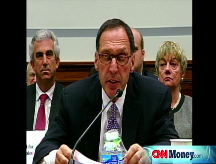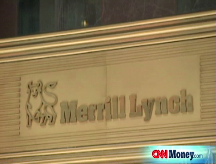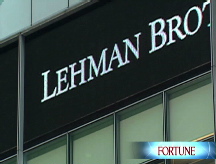Aftermath
 |
| Paulson (left) and Bernanke say the was no way for them to have saved Lehman. |
At around 1 p.m. Tuesday, the FSA signed off and Barclays announced it had bought much of Lehman's business in the U.S., subject to bankruptcy court approval, which was granted - on an extremely expedited basis - on Friday, September 19. "Lehman Brothers became a victim," Judge James Peck said in approving the deal. "In effect, the only true icon to fall in the tsunami that has befallen the credit markets. And it saddens me."
In the days following the collapse of Lehman Brothers, the government came to the rescue of AIG - eventually to the tune of $150 billion; created the TARP - the Troubled Asset Relief Program - for $700 billion; and saved Citigroup by pumping in $45 billion in equity and effectively underwriting $306 billion in toxic assets (Citi agreed to take the first $29 billion loss on the pool.) Goldman Sachs and Morgan Stanley would morph from investment banks into bank holding companies regulated by the FDIC, the same agency that monitors commercial banks. Wall Street would never be the same.
Many of the principal actors in the drama of the September weekend have been transformed as well. The Lehman crowd is no longer who they used to be. Bryan Marsal, a noted turnaround expert, has replaced Fuld as CEO of Lehman Brothers Holdings, and is busy liquidating the remaining assets of the firm. Fuld has been moved out of his palatial office to more modest digs on the 45th floor of the Time & Life Building, which houses Fortune as well. He was spotted entering that building recently wearing a tuxedo. A security guard stopped him on his way through the lobby and said "Huh? What's that name again?"
No one is crying for him. In addition to some world-class real estate in Manhattan, Greenwich, Connecticut, Sun Valley, Idaho and Jupiter Island, Florida, Fuld probably has around $100 million in the bank, including $20 million just received from selling a portion of his and his wife's art collection. He's reportedly also considering opening his own advisory boutique.
In addition to the $639,082 Fuld received for selling 2.87 million shares for twenty cents each on September 17 (he still has another 503,744 shares that are now worthless), he also has a grand jury subpoena from three U.S. attorney's offices in the Eastern and Southern districts of New York, and in the district of New Jersey, which are investigating whether Lehman executives made false or misleading statements about the firm leading up to its collapse.
Thain has agreed to stay on at the combined Bank of America/Merrill after the deal closes in a few weeks. He will continue to oversee the Merrill Lynch businesses at Bank of America and report directly to Lewis. He will no doubt have a large role in helping to eliminate 35,000 jobs - as has been announced - at his new firm. His triumph of that weekend has been tainted, in part, by the fact that the fall in Bank of America's stock since September 15 has reduced the value of the deal to Merrill's stockholders to around $20 billion, from $50 billion. Still, that is better than the zero dollars received by Lehman's shareholders. Thain also misjudged the zeitgeist by asking for a $10 million bonus this year from the Merrill board and had to quickly retreat in the face of negative publicity and the outrage of many, including Andrew Cuomo, New York's attorney general.
Geithner emerged from the weekend in the best shape of all. Puffs of smoke emanating from the palazzo suggested in the aftermath of the calamity that he was more inclined than his brethren to try to find a government solution for Lehman Brothers. In any event, he seems to have passed his six-month trial by fire and is awaiting his confirmation hearing to become secretary of the Treasury in the Obama administration.
When Bernanke and Paulson have discussed their decision to let Lehman fail, neither one has any doubts about the wisdom of their decision. "A public-sector solution for Lehman proved infeasible," Bernanke said at the Economic Club of New York on October 15, "as the firm could not post sufficient collateral to provide reasonable assurance that a loan from the Federal Reserve would be repaid, and the Treasury did not have the authority to absorb billions of dollars of expected losses to facilitate Lehman's acquisition by another firm. Consequently, little could be done except to attempt to ameliorate the effects of Lehman's failure on the financial system."
On Monday morning, September 15, as the Lehman volcano was spewing molten financial lava to every corner of the globe, a pale and tired-looking Paulson - whose brother worked for Lehman, in Chicago - said at a White House press conference that he "never once considered that it was appropriate putting taxpayer money on the line in resolving Lehman Brothers." He added, "Moral hazard is not something I take lightly."
William D. Cohan is the author of "The Last Tycoons: The Secret History of Lazard Freres" and the soon-to-be-published "House of Cards: A Tale of Hubris and Wretched Excess on Wall Street" ![]()
-
 The retail giant tops the Fortune 500 for the second year in a row. Who else made the list? More
The retail giant tops the Fortune 500 for the second year in a row. Who else made the list? More -
 This group of companies is all about social networking to connect with their customers. More
This group of companies is all about social networking to connect with their customers. More -
 The fight over the cholesterol medication is keeping a generic version from hitting the market. More
The fight over the cholesterol medication is keeping a generic version from hitting the market. More -
 Bin Laden may be dead, but the terrorist group he led doesn't need his money. More
Bin Laden may be dead, but the terrorist group he led doesn't need his money. More -
 U.S. real estate might be a mess, but in other parts of the world, home prices are jumping. More
U.S. real estate might be a mess, but in other parts of the world, home prices are jumping. More -
 Libya's output is a fraction of global production, but it's crucial to the nation's economy. More
Libya's output is a fraction of global production, but it's crucial to the nation's economy. More -
 Once rates start to rise, things could get ugly fast for our neighbors to the north. More
Once rates start to rise, things could get ugly fast for our neighbors to the north. More










